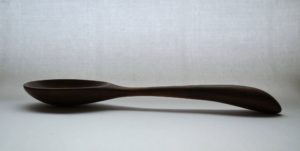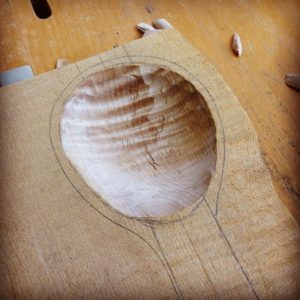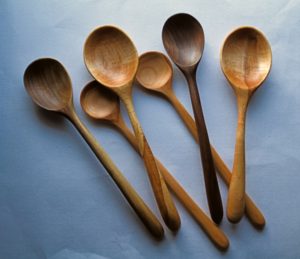Amanda Slamm & Mimosa Mack
Mimosa Mack and Amanda Slamm: “It’s the New England in us”.
An interview with Mimosa Mack and Amanda Slamm, co-founders of Sprig Woodwork, in South Solon, Maine.

The early spring potholes have made getting to Amanda Slamm and Mimosa Mack’s workshop a bumpy, but a well-rewarded journey. My route to South Solon—workshop headquarters—has led me by the notable South Solon Meeting House and brought me within miles of the Skowhegan School of Painting and Sculpture—the area breathes creativity.
Amanda and Mimosa are sisters and together they co-founded Sprig Woodwork, making handcrafted wood utensils and other kitchen wares. Their workshop in Solon is exactly the place you might expect to find a talented creative—or two—it’s weathered and rustic, a true Maine barn if you ever saw one.
Before Amanda and Mimosa, the workshop belonged to their dad, Roy Slamm, who was a fine cabinet maker. At one point their mother, local artist Abby Shahn, had her studio in the workshop as well, “you can imagine how well that worked out with wood shavings flying around”, jokes Amanda.
Mimosa and Amanda returned to the workshop around 2011, after their father had passed, to be close to him and the wood that was his livelihood. Although Roy was gone, the wood was not and there was a lot of it. They began to make small tables and cutting boards. Those sold and they really liked that, putting their own art into the world, so they kept going. They weren’t looking to make big cabinets like their father but they followed in his footsteps—and their mother’s—by creating small, functional, works of art in the form of kitchen utensils and tools.
The sister’s woodworking careers started long before 2011. It began when they were children doing the “grunt” work of sanding their dad’s projects, though it went beyond just sanding. Amanda recollects that “if you wanted anything done, like a Victorian doghouse, you were there helping”, as any child of a woodworker would be.
 Sprig Woodwork is especially known for their carved wooden spoons. The spoon’s rich coloring and smooth texture are unparalleled (probably because of all the sanding practice growing up). They got into making spoons from a friend of their father’s who came by one day with a bucket of tools and a lesson. From then on spoons became their muse. Mimosa and Amanda keep in touch with a lot of their dad’s friends, many of whom are woodworkers and support their work in various ways, sometimes by dropping off piles of scrap wood for their use.
Sprig Woodwork is especially known for their carved wooden spoons. The spoon’s rich coloring and smooth texture are unparalleled (probably because of all the sanding practice growing up). They got into making spoons from a friend of their father’s who came by one day with a bucket of tools and a lesson. From then on spoons became their muse. Mimosa and Amanda keep in touch with a lot of their dad’s friends, many of whom are woodworkers and support their work in various ways, sometimes by dropping off piles of scrap wood for their use.
In addition to spoons, Amanda and Mimosa make tongs, spatulas, bread knives, chopsticks, pizza peels, cutting boards, etc. and they can do all that with wood scraps that would normally be tossed on the burn pile. Sprig Woodwork sort of has an up-cycle business model. Woodworker friends drop off buckets of scrap material that is unusable to them but big enough for Amanda and Mimosa to plank out and use in almost any design—Amanda aptly observes, “it’s the New England in us”. On occasion, they’ll buy exotic woods to incorporate into their pieces for fun. Mimosa drops a piece of African Black Wood into my palm which sinks under the surprising weight, it’s more rock than wood, “this is not something you ever want to cut with a saw you like”, she advises. They also source from the building next door, it’s chock full of their dad’s wood, many of it harvested and sawn locally. Mimosa estimates the oldest wood is from the ’80s. One year their dad was commissioned to build high chairs for an American doll convention. The company sent him California Red Cedar to use for the chairs but he asked to use White Pine instead and ended up keeping the Red Cedar for himself, although it has yet to be used.

As Amanda and Mimosa walk me through their repertoire of products they note that they’ve had a few flops along the way. Their favorite “flop” was a doughnut turner. It was initially a custom request from a client but they figured while they were at it why not make a few dozen more. Well, since then they’ve only sold one or two and Mimosa speculates they’re likely being used as a stirrer. They’ve learned a lot since they started, like wetting the wood after shaping it to let the grain rise—that’s when the hairs stand up—and then sand it down again. Letting the grain rise and sanding it down multiple times keeps the wood smooth and polished. The sister’s speculate their first batch of spoons, before they knew to let the grain rise, are pretty rough by now.
With such a wide inventory, what are Amanda and Mimosa’s favorite utensils to make? Mimosa says the cheese knives are the least fun and both sister’s like the spoons for the creativity aspect but admit they are more work and not as financially efficient. It’s obvious though that no matter what they’re making, whether it’s a pizza peel, a fussy cheese knife, or a beautiful spoon, they put their heart, soul, and talent into each piece.
Mimosa and Amanda may have started out as workshop grunt laborers, sanding and re-sanding for their dad, but they’ve certainly carved out their own place in the woodworking world. Their craft is a result of their parent’s creative disciplines (wood and fine art) combining forces to create artistic, creative, and function kitchenware. Each piece is a homage to their family and heritage.
Sprig Woodwork was recently featured in Down East Magazine’s April food edition (p. 39). You can purchase their spoons and other kitchenware at River Roads Artisan Gallery (opening May 4) and on their Etsy shop. Make sure to follow them on Facebook and Instagram for product releases and promotions.


